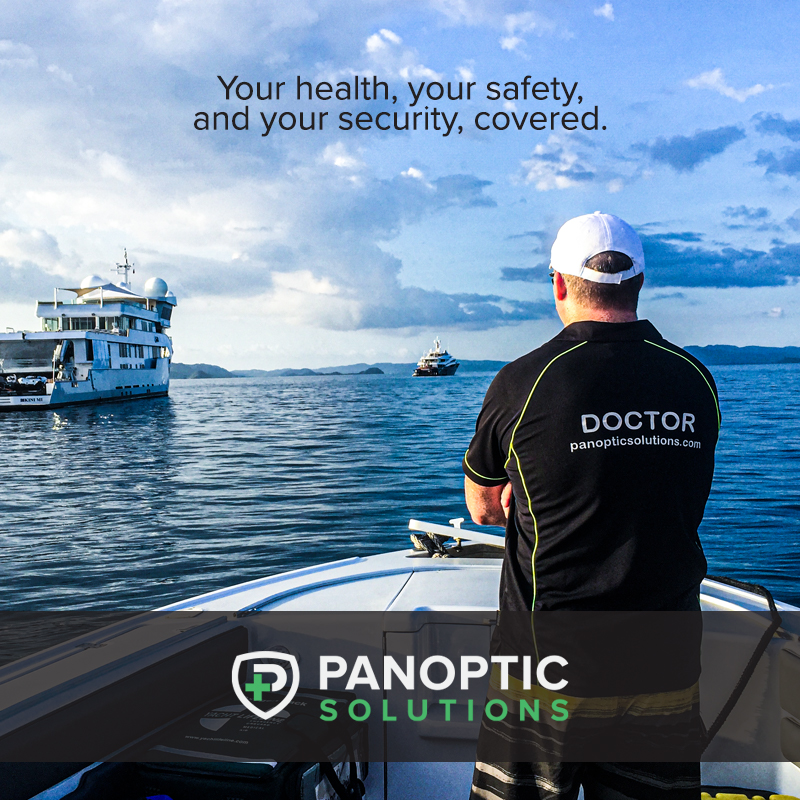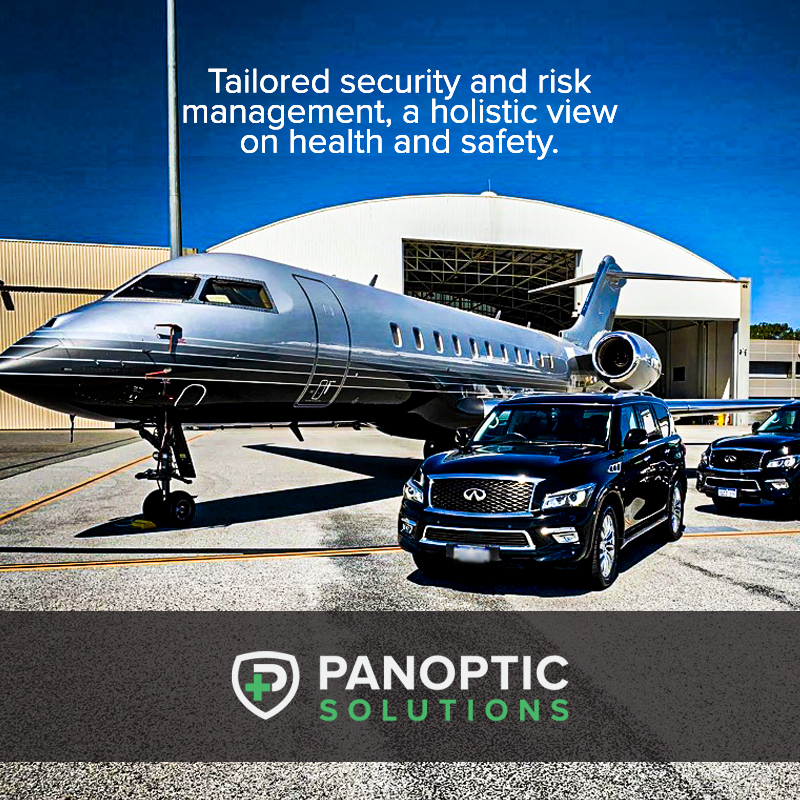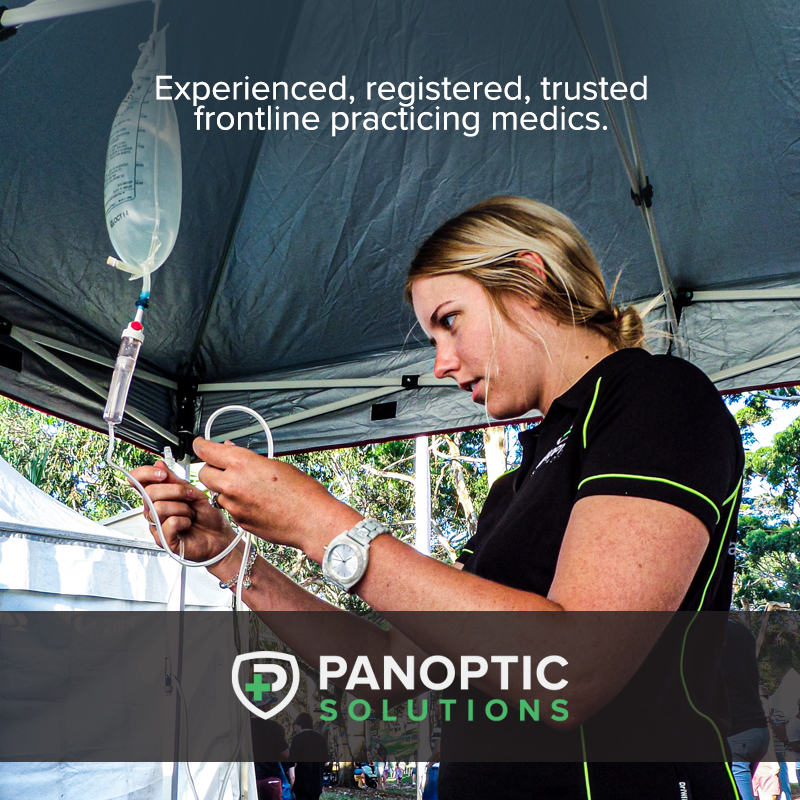We sat down with Troy Claydon, paramedic and managing director at Panoptic Solutions, for an insightful chat on executive protection in Australia, and the role of medical assistance in EP.
In recent months we have seen an uptick in demand for personal protection by clients and an increased interest from future security professionals. Why do you think that is, and what are the main must-haves for new professionals entering the industry?
As Covid restrictions start to lift, more and more clients want to travel, whether for a post-lockdown vacation or just getting back to business. However, there is still a level of uncertainty attached to that.
Clients want to know that they are safe while traveling but may not know the intricacies about how to develop contingency plans or locate the most appropriate hospital to where they are staying. Or trust that their hired driver will be taking C19 precautions. Or what to do and where to go if a snap lockdown was to occur. They look to reputable companies that take a holistic view of their travel safety.
Even with the restrictions during Covid, there has still been some movement by those who can afford to navigate the red tape. And also by individuals who can afford to fund the measures imposed by governments. All with the goal to ensure that both they and the community remain safe. These restrictions include vehicle escorts to and from airports or ports of entry. Furthermore, residential security, Covid safety officers, Covid action plans, and liaison with other external key stakeholders are included.

Although there is movement, it’s not quite at the levels of pre covid. It may be a difficult time for those looking to break into the industry. However, that’s not to say impossible. Where there’s a risk, there’s opportunity. Besides having a solid base with training from a reputable provider (Ronin SA, PFC, ESI, Lasorsa, Excellentia UK, etc.), build on your medical skills above a standard first aid course and become proficient in it.
Lastly, I would delve deeper into Covid-19. It’s here, at least for short to midterm, and it’s fresh in clients’ minds as they have lived through it. Clients will request Covid action plans, masks, and sanitizers for a long time to come. If you can stand out by having greater knowledge about how all these items keep your principals safer, then you are more employable and will be asked back.
Australia has been known for its strict anti-COVID policies, introducing lockdowns even due to a handful of positive cases in individual states. How is this affecting executive protection in Australia and the provision of EP services in the country, as well as domestic EP firms working internationally?
Australia consists of a national federal government as well as several state and territory governments. Our constitution and laws allow the states and territories to take control of their respective jurisdictions in times of a health crisis. To this end, we have had mixed responses from all levels of government.
There has certainly been an impact on the industry as a whole. Like many other companies and providers, we went from having a full schedule in 2020 to essentially having a relatively clear calendar almost overnight. That said, it’s interesting how things work out.
Although Australia’s strict border closures have caused disruptions, it’s provided an opportunity. Globally, Australia has been seen as a success story and even a safe haven due to the way it has managed Covid-19. We have had several international clients reach out to us to assist with navigating and facilitating extended stays here in Australia.
Services have included:
- Assisting with applications to the government.
- Providing Covid-19 risk management plans.
- Conducting TVRAs on properties clients have rented or purchased.
- Providing secure and sanitized transportation.
- Establishing residential security teams as well as traditional close/executive protection.
We have also had several domestic clients consult with us for Security and Medical risk management advice related to quarantining interstate due to restrictions in their own states.
Since you mainly operate in Australia and Asia, what would you say are the key differences in client demand between the two continents? What are the particular services that clients require from you in Australia as opposed to Asia and vice versa?
Covid restrictions aside, Australia is generally an easier country to operate in. Things run typically smother and lead times don’t need to be as lengthy. Moreover, most client requests are usually easier to facilitate. External parties are generally easier to work with and understand their role or where they fit into an EP operation. Of course, there is red tape, restrictions, and laws that we need to navigate.
However, an experienced local lead will know how to do this. Client demand is still high in Australia. We deal a lot with families, HNWI, and business executives who have regular EP teams. Thus, we become an extension of that team while traveling to/through Australia. Services vary from secure transport and drivers to full protection details and medical support.
We have done jobs where it’s been a single security driver. Opposite to this, we had tasks that required us to provide 12 vehicles and security drivers, 5 EP agents/operatives, plus residential security teams across multiple locations in Australia. Essentially, replicating these numbers across the country.
Asia and, in particular, South East Asia tends to have more challenges. If you are not experienced dealing with them, they can bring a team and an EP operation unstuck very quickly. Lead time is one of the essential commodities when planning or conducting an EP operation in this region. Factors such as traffic, cultural differences, communication, and access to specific items or agendas can cause significant delays.

Regarding services, there tends to be a higher demand for quality agents/operatives through the region. Typically, we tend to augment security teams from the US, UK, and other neighboring Asian countries with our team members. We also provide vetted drivers – there’s not an abundance of “security drivers” as quality training in Asia is limited. However, we have a small pool of either off-duty or former mil/LE personnel with specific VIP protection training.
In some cases, we are able to arrange police escorts and residential security. Halls and walls static security is often another request we receive from clients. Medical support is another big-ticket item. Several of the countries we operate in have limits in their medical capabilities and response. Therefore, many of our clients request our remote medical or expeditionary medical services.
What is cooperation like between your company and those abroad in, say, the US or Europe? Is your firm a member of any official EP networks, and do you think that security professionals are more in sync today than in previous years?
We have individual memberships with various organizations, including ASIS, Protective Security Council in the US, and the Australian Tactical Medical Association, to name a few. We encourage our team members to attend several conferences per year (when restrictions aren’t occurring), maintaining our ties to the broader network and other relevant organizations.
Conferences such as ASIS GSX, IPSB Close Protection Conference, Asian Defence Expos, and the Extreme Medical Conference are held in the UK. I would agree that security professionals are more connected. In addition to those organizations previously mentioned, there are many platforms from social media to podcasts and security-specific forums such as VIP Local Asset, which are working to advance the industry. There are plenty more out there from when I first started in the industry, that’s for sure.
Relating to one of your organization’s specialties, can you explain how medical risk management pertains to executive protection and how best to incorporate it into EP programs? What can individual industry professionals do to bring this topic to the forefront of EP?
A risk is a risk. Irrespective if it’s in the form of a violent attack by a fixated person, or if it’s a heart attack or a road traffic incident – the result can be the same. As security practitioners and EP professionals, we must take a holistic approach to our clients’/principals’ safety and security. This approach importantly includes medical risk.
At Panoptic Solutions, we start all our tasks with a request for information (RFI) to the client. This RFI includes the usual essential matters such as task dates, locations, venues, schedule, likes, dislikes, etc. Finally, of course, a medical profile. We like to dig deep into this (as far as the client is happy to divulge).
Medical information is more than just asking for allergies. Of course, this is important, but having pertinent previous medical history will help determine the best medical facility for a medical emergency. It will also provide us with a greater indication of medications and medical devices we may need to carry over and above standard items.
It’s also the small items that tend to make or break an EP operation. In other words, the ability to treat the principal’s family members for stomach aches or runny noses. Primary health care is usually a war winner and remembered long after you’ve told someone how good you are with a tourniquet.

We tend to embed at least one medic into our teams. It’s a value add and force multiplier when running any details. It provides both the principal and the other team members with a higher degree of comfort. That way, we know that appropriate and immediate medical care is on hand if there is a medical incident.
We are very fortunate to have a very experienced and hands-on Medical Director, former Army physician, Dr. Kieran McCarthy. He provides us with clinical practice oversight and heads our clinical governance team. His leadership allows our Paramedics the ability to provide advanced interventions while working in Australia and abroad.
I feel that security practitioners should take a balanced approach to their training. It’s great doing all the “sexy skills” such as shooting, driving, and defensive tactics. However, we need to take time out to go over the basic ABCs or MARCH (whichever acronym you feel comfortable with). Invest in some advanced medical training. Confidence is king when it comes to a medical incident. If you know what you’re doing, it will come across in your treatment. Understandably, your patient will be far better off for it.
Why is on-hand first response medical assistance one of the core areas for your organization?
As previously mentioned, it’s a force multiplier. The ability to add an advanced medical capability into any CP/EP team provides peace of mind to all involved. Knowing that your team has the ability to start advanced medical interventions before arriving at the hospital, or even before an ambulance arrives, is a real advantage in narrowing the gap between the initial stages of treatment and final recovery.
For executive protection in Australia, can you talk more about some of the most dangerous workplace-related situations where you or your company had to intervene to save a client from harm’s way?
Fortunately, Australia is generally a safe country. However, it’s usually the clients’ and principals’ profiles which raise the threat and risk level.
A lot of what we have dealt with has been relatively benign. The reality is, much of the risk mitigation is in the planning. If we are in a tussle or we end up in a physical confrontation, we haven’t planned things right.
With this said, we have had a few hostile terminations where the subject has become physical, and we needed to restrain them. We have had the odd incident with members of our RST. They “redirected” intoxicated persons attempting to enter incorrect hotel rooms. Then we’ve also assisted in minimizing incidents to reduce any reputational risk to the principals.





